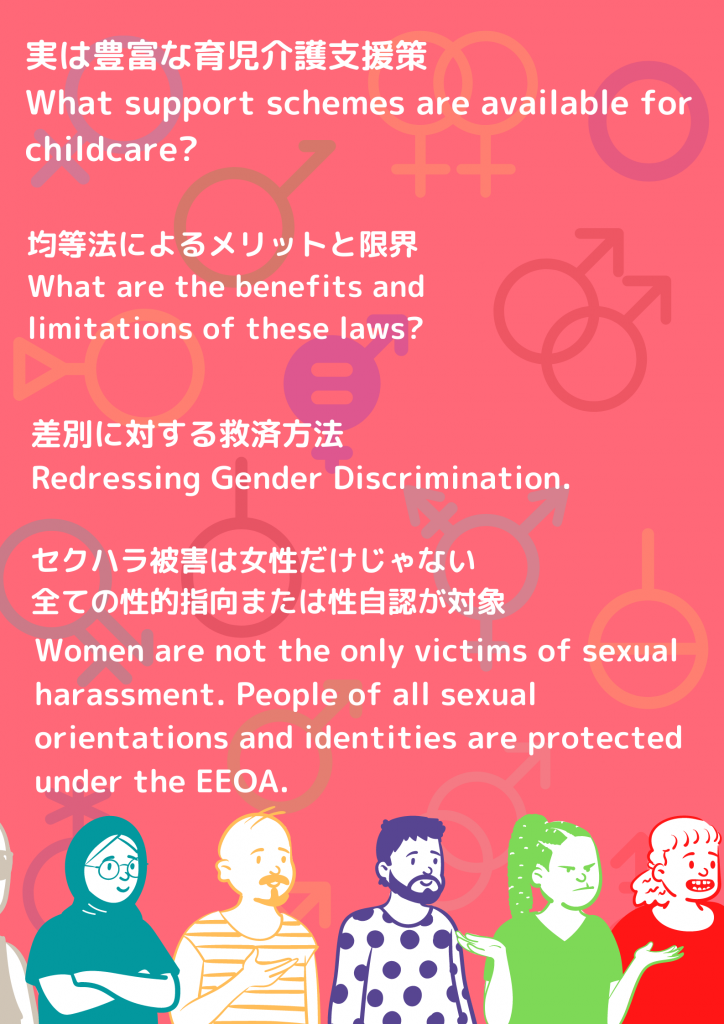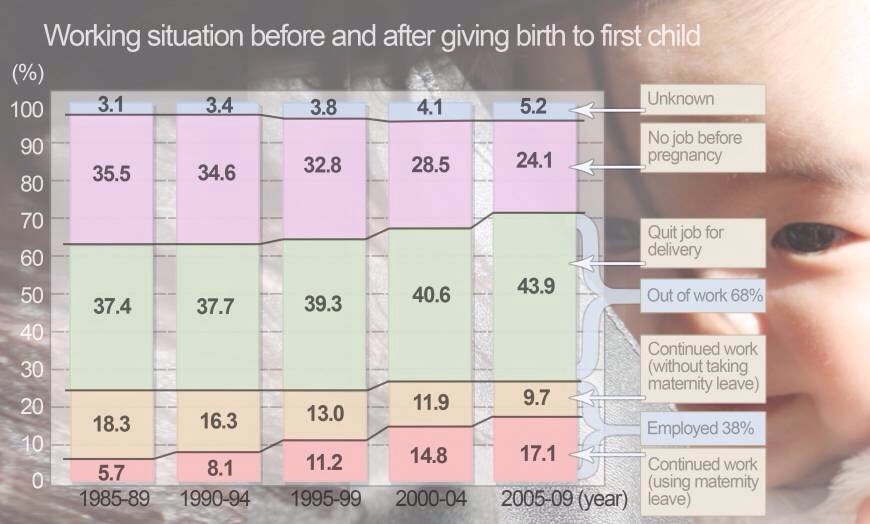弁護士加藤佳子東ゼン労組執行委員長奥貫妃文は産後産前休暇とマタハラパタハラを講義する。
Attorney Kato Keiko and Tozen President Hifumi Okunuki teach us about the law and legal cases around maternity leave, and maternity and paternity harassment.
maternity rights, paternity rights, parental rights
弁護士加藤佳子東ゼン労組執行委員長奥貫妃文は産後産前休暇とマタハラパタハラを講義する。
Attorney Kato Keiko and Tozen President Hifumi Okunuki teach us about the law and legal cases around maternity leave, and maternity and paternity harassment.


11月の東ゼン大学は、均等法についてです。
講師には、加藤桂子弁護士にお越しいただきます。
2020年11月15日(日)14:00〜YouTubeライブ配信します。
コメント欄にて質問も受け付けますので、ぜひご視聴ください!
Atty Keiko Kato will lecture on Equal Employment Opportunity Act Tozen Daigaku (YouTube livestream). We’ll take questions after the lecture, so ask us in the comments section.
CONTRIBUTING WRITER
On paper, mothers and fathers are entitled to take child care leave (ikuji kyūka) at the same time for up to a year and receive two-thirds salary for the first six months and half salary for the second six months. However, eligibility depends on having worked for your current employer at least a year and expecting to be employed a year later.
Elles ne donneront pas leur nom et n’apparaîtront pas en photo. La honte, la timidité, le «dégoût» de soi et la peur de perdre leur emploi sont toujours vifs. Il leur a donc fallu «beaucoup d’énergie pour trouver la force de parler», de nommer les choses et de préciser les gestes. Avant de porter plainte et d’entreprendre une action en justice, qui aura peut-être une issue ce mardi lors d’une nouvelle audience au tribunal de Kobe.
A.T. et Y.T. ont toutes les deux 24 ans et leur histoire illustre comment le harcèlement sexuel peut être, au Japon également, une réalité aussi triviale que répandue dans le monde du travail. En mars, un rapport du gouvernement révélait qu’un tiers des employées étaient harcelées sexuellement. Sur les 1 700 femmes qui ont accepté de répondre à l’enquête, 40 % citaient des cas d’attouchements non désirés. Et 63 % ont choisi de ne rien dire.
執行委員長奥貫妃文が、フランスのリベラシオン誌Arnaud Vaulerin記者より、マタハラの件で取材を受けました。記事のメインはマタハラネット代表の小酒部さやかさん。奥貫は、マタハラが起こる背景や法規定との関連についてコメントしました。
Executive president Hifumi Okunuki got interviewed by Liberation in the French press journalist Arnaud Vaulerin about Japanese matahara (maternity harassment). The article is about Sayaka Osakabe of Matahara Net. Okunuki made a statement about the background of matahara.
Last Thursday’s Supreme Court verdict in the “maternity harassment” case brought by a physical therapist in Hiroshima was the first of its kind, overturning decades of business-friendly jurisprudence along with rulings from the district and high courts.
As I mentioned in last year’s September Labor Pains (“Mata-hara: turning the clock back on women’s rights”), the word mata-hara is short for maternity harassment, just as seku-hara and pawa-hara refer to sexual harassment and power harassment, respectively. Maternity harassment means workplace discrimination against pregnant or childbearing women, including dismissal, contract nonrenewal and wage cuts.

Matahara: turning the clock back on women’s rights
‘Maternity harassment‘ concept coined amid reports of bullying over pregnancy at work
BY HIFUMI OKUNUKI
“When I told my company I was pregnant, they fired me.”
“I was delighted to be hired by a company I loved. Then my boss made me promise not to get pregnant for a while.”
In last October’s Labor Pains, I discussed maternal job rights in “Labor law protects expectant and new mothers — to a point.” Today, I would like to address a new legal concept known as “maternity harassment,” or matahara, in the syllabic acronym engendered by this growing — and disturbing — trend.